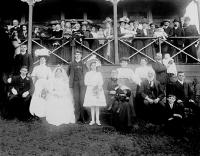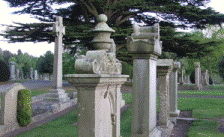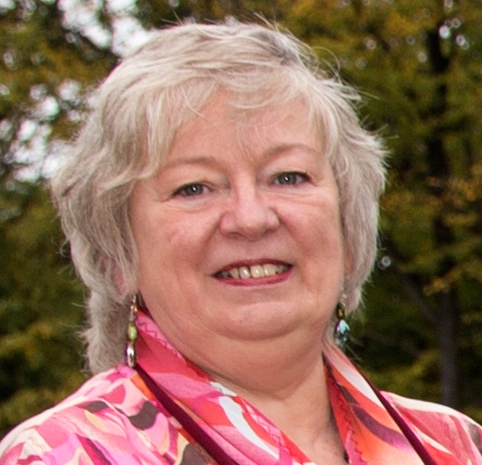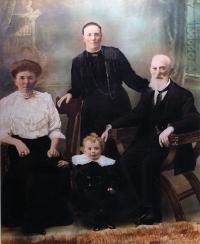- Birth*: Frederick Fox was born circa 1907.1
- He was the son of Charles Francis Fox and Frances Kidd.1
- (Officiating Clergy) Marriage: Frederick Fox officiated at the marriage of Edward Henry Gear blacksmith and Margaret Guthrie Kidd on Tuesday, 10 August 1909 at residence of William Kidd, Millerton, Buller, New Zealand
 ; Henry was a 22 year-old bachelor & blacksmith born in Westport and residing in Millerton. Margaret was an 18 year-old spinster with no listed profession, born in Brunnerton and residing in Millerton. Married by certificate. Both signed their names. Marriage witnesses: James BROWN (storekeeper at Millerton), Myrtle KENNEDY (domestic duties) & William KIDD (Margaret’s father).2,3,4
; Henry was a 22 year-old bachelor & blacksmith born in Westport and residing in Millerton. Margaret was an 18 year-old spinster with no listed profession, born in Brunnerton and residing in Millerton. Married by certificate. Both signed their names. Marriage witnesses: James BROWN (storekeeper at Millerton), Myrtle KENNEDY (domestic duties) & William KIDD (Margaret’s father).2,3,4 August 9th 1909, Millerton, New Zealand. Wedding of Margaret Guthrie Kidd and Edward Henry Gear.
August 9th 1909, Millerton, New Zealand. Wedding of Margaret Guthrie Kidd and Edward Henry Gear.
Wedding party L-R : William Esau Kidd (with unknown best man seated in front), Isabella Kidd aged 20, Margaret Guthrie Kidd, bride aged 18, Edward Henry Gear, groom aged 22, Elizabeth Ann McQueen Kidd aged 11, Ann McQueen Kidd, mother of the bride aged 42, on her knee Fred Fox aged 2, Frances Fox nee Kidd aged 22, Margaret Guthrie Broadfoot, sister of the mother of the bride aged 39, Thomas Alexander aged 84, Jack Broadfoot holding his son Johnny, Thomas Alexander Kidd aged 21, Albert Kidd aged 15 seated on ground. Unfortunately the father of the bride, William Kidd, was standing at the extreme left hand side, but the photographer had his thumb over the lens and William Kidd was blotted out! - (Witness) Note for Web: Frederick Fox and William Kidd tinsmith, Frances Crawford, James Hart Kidd, Alexander Thomas Kidd wholesale jeweller, Catherine Thomas, Thomas Fraser Alexander contractor, Isabel McLean, Frances Kidd and Elizabeth McQueen Kidd were mentioned with William Kidd and Ann McQueen Alexander. William was born at home in 158 Cumberland Street in Glasgow on 5 September 1860 and named for his father's father William KIDD according to Scottish custom. Tragically, his 21 year-old mother Frances died of puerperal (childbed) fever when he was just nine days old.
He can't be found in the 1861 Scotland census but the 1871 census shows William as a scholar aged ten, living with his bachelor uncle James Hart Kidd in Govan, Glasgow. William does not appear in the censuses after 1871 and his uncle James was lodging with a Mary Ann McPhail and others in 1881.
Why didn't William live with his father Alexander? Alexander appeared in the 1861 census living with his mother Catherine. After his wife died, it almost seems like Alexander didn't want anything to do with his son. I wonder how that made William feel, to maybe be blamed for his mother's death and to all intents and purposes, deserted by his father?
William went to sea in the 1870s when he was about 15 and worked on sailing ships for several years. Some time before 1885 he made his way to New Zealand and decided to stay.
He worked as a coal miner in Brunnerton. He was of small stature and appeared frail. He always made the porridge in the morning, claiming only a true Scotsman knew how to make it.
Ann was named for her mother's mother, Anne McQUEEN.
She was born at Stafford, Hokitika during the gold rush era. Situated on the bar-bound mouth of the Hokitika River on the West Coast of the South Island, Hokitika sprang into life in 1864 when gold was found at her back door and despite its hazardous entrance and the snags that infested the river, Hokitika was officially gazetted as a port on 8 March 1865 by the Canterbury Provincial Government which was desperate for revenue. It developed into a thriving mining town and an important port. The first settlers were John Hudson and James Price who set up a store on the banks of the Hokitika River in 1865 to cater for the miners pouring in following the gold strike in 1864. In 1866, with a population of more than 6,000 the town was almost twice it's present size. People were either digging for gold along the banks of the river or servicing the gold mining industry that had spread along rivers in the region. By 1866 Gibson Quay was usually crowded with small ships - or at least those that had survived the ordeal of entering port. Despite this more overseas vessels and more immigrants arrived at Hokitika than at any other New Zealand port in 1867. Between 1865 and 1867 there were 108 strandings - 32 of which were total wrecks. River floods joined the surf in making difficulties. Food and supplies came by sea by many coasting-craft which broke their backs crossing the bars or which ended their working-life on the north or south. Hundreds of adventurers were willing to pay £5 apiece for the 12 hours' passage from Nelson and the high rates of insurance did not deter ship-owners. The Hokitika Harbour Board did not come into existence until 1876 and the Hokitika Harbour limped on long after the gold ran out, trade dwindled and the port was closed in 1954. Hokitika was the largest 'port of value' between 1865 and 1867.
In 1948 there still several banks, hotels, boarding houses, a hospital, newspaper, breweries, dairy factory, a whitebait canning factory etc. and the largest gold dredge in the world was still working three miles from the town. The population of the Hokitika borough was 2,840 with gold mining (sluicing and dredging), saw milling and farming the chief support for the town.
Ann was the elder daughter of Isabel and Thomas. Her father was the mine manager at Brunnerton when she met William Kidd.
She was a self-taught nurse and midwife. It must be remembered that they always lived in mining communities that were quite small and most had no doctor, and the nearest hospital was far away. Ann's grandson Frederick ("Snowy") Fox had grown up with his grandparents close by. Snowy told how his grandmother Ann was often out at nights attending sick people or delivering babies.
When Snowy himself was born his mother Frances (nee Kidd) was very sick and they could not get Snowy to breathe. He was premature and weighed only two and a half pounds. Ann put him under the kitchen tap and ran warm water over his face; after two minutes of this he cried. She oiled him, wrapped him in cheesecloth, tucked him under her coat and took him to her home, which was just along the road. Despite his perilous beginning, Snowy lived till his nineties.
Ann got her skills from delivering many babies over many years and looking after sick people. With her daughter Elizabeth (Ann), she also laid out the bodies of anyone who died. (Ann) was about 15 when her mother died so she was pretty young to be doing this.
In 1895 the family moved to Millerton.
On 20 October 1914 Ann died in Westport of breast cancer. William was an electrician at this time and went to Otira to work on the tunnel project. Work had begun around 1909-10 on the building of a tunnel through the Southern Alps, connecting Westland and Canterbury. His youngest daughter Elizabeth (Ann) went with him, presumably to keep house.
William and Elizabeth (Ann) later moved to Wellington where William worked as an insurance agent. Upon Ann's marriage in 1918, William's address was 92 Austin Street. One year later, both were living at 29 Edinburgh Terrace.
While living in Wellington, William took his grandson Frederick ("Snowy") Fox to buy a new pair of boots to match his new suit. When William felt in his pocket for the money to pay for the boots, he discovered he had been the victim of a pickpocket. He was upset, but the next day went back to the shop, paid for and collected the boots. William decided he would not lose any more money to a pickpocket. He purchased a gun and carried that in his pocket, only to lose the gun to another pickpocket.
Snowy remembered his grandfather taking him on many occasions, down to the docks to see the ships that came into Wellington Harbour. William never lost his fascination with ships or his love of the sea.
William lived with his daughter Elizabeth (Ann) and family in John Street, Newtown in Wellington till he died in Wellington Hospital on 17 July 1927.
NEW ZEALAND ELECTORAL ROLLS -
1885-86, Greymouth electorate, KIDD, William, Coaldale, miner.
1890, Greymouth electorate, KIDD, William, Coaldale, miner.
1893, Grey electorate, KIDD, William, Coaldale, miner, residential.
1896, Motueka Supp 1 electorate, KIDD, William, Seddonville, miner.
1905-06, Buller electorate, KIDD, William, Millerton, engine driver.
1911, Westland electorate, KIDD, William, Otira, labourer.
1914, Buller electoratel, KIDD, William, Granity, engine driver.
1919, Westland electorate, KIDD, William, Otira, labourer.3 - [S40] From CMF [Jul 2012].
- [S98] Unknown author Marriage certificate/register, n.pub., n.p., unknown edition (unknown publish date) unknown isbn.
- [S123] LGB, Tait Gear & related surnames in "LGB GEDCOM via FB", listserve message to Facebook, 2015. Printout dated 11/11/2015, [Nov 2015]. Hereinafter cited as LGB GEDCOM.
- [S40] From CFmsM [Mar 2010].
Frederick Fox1
M, #9335, b. circa 1907
Last Edited: 21 Jul 2019
Parents:
Father*: Charles Francis Fox1 b. 9 Mar 1878, d. 9 May 1961
Mother*: Frances Kidd1 b. 1887, d. 16 Jun 1958
Mother*: Frances Kidd1 b. 1887, d. 16 Jun 1958
Relationship:
5th cousin 1 time removed of Patricia Catherine Adamson
 Genes on the Web
Genes on the Web
